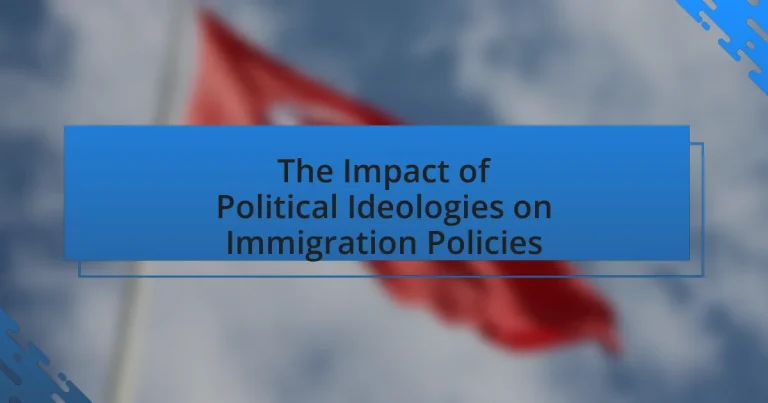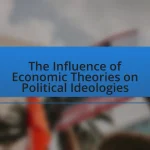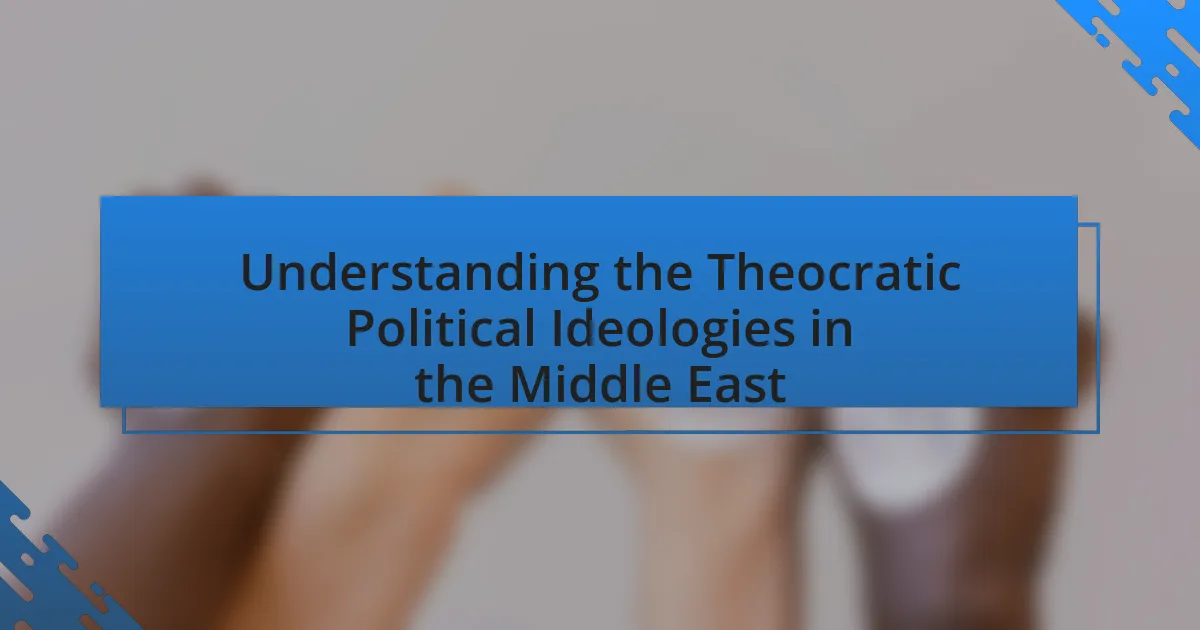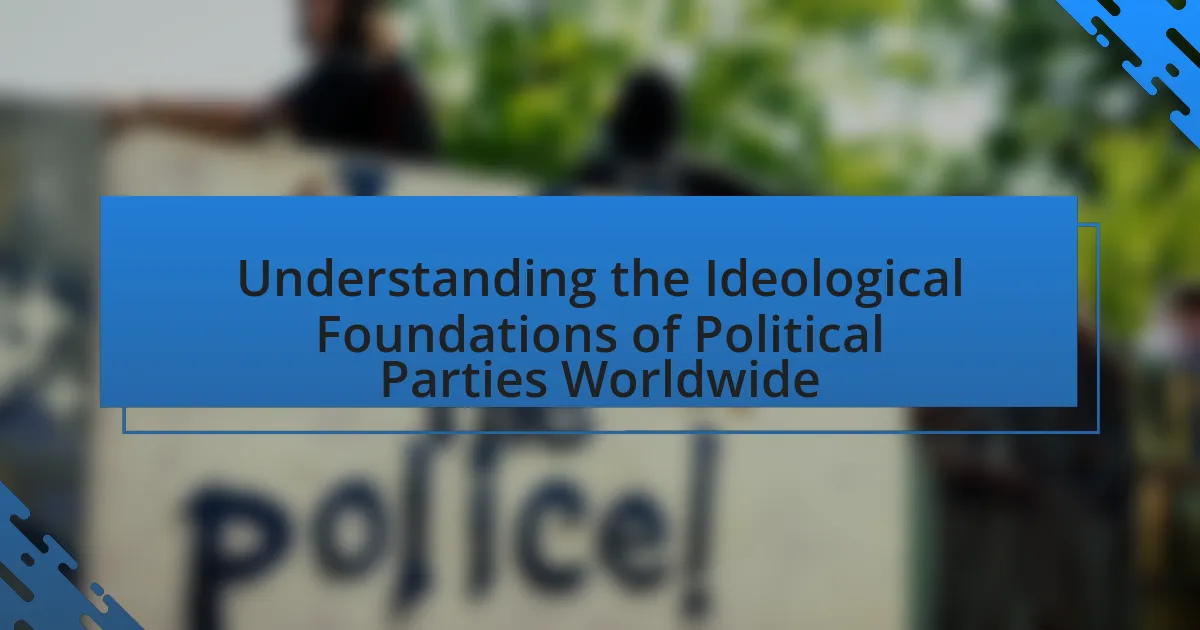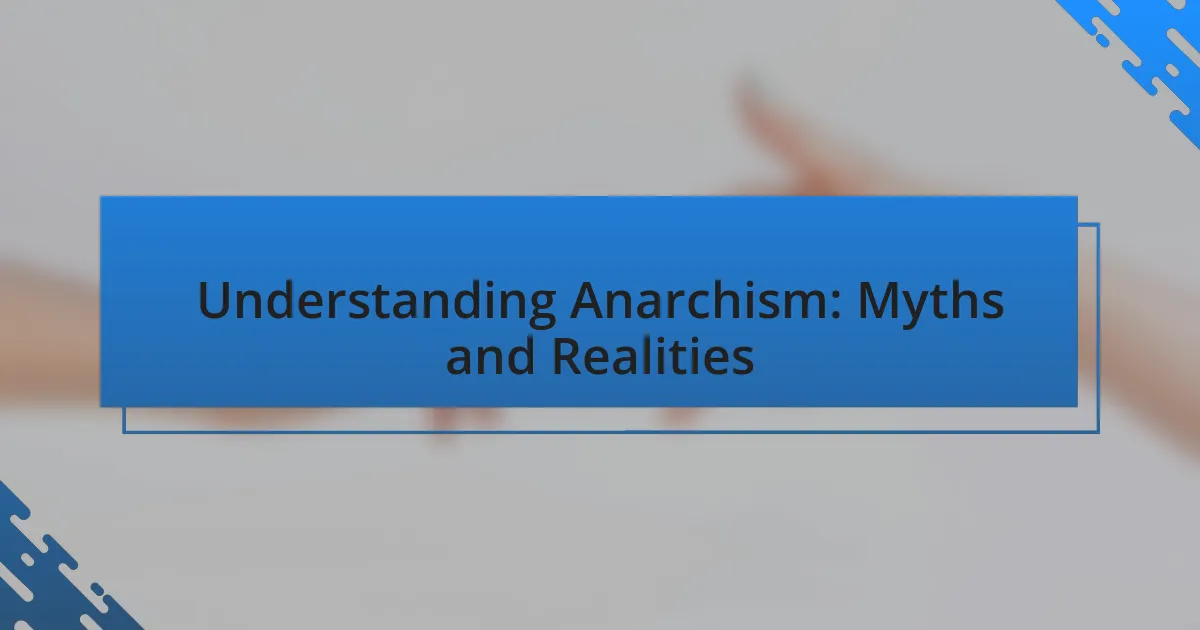The article examines the impact of political ideologies on immigration policies, highlighting how liberal, conservative, and nationalist beliefs shape governmental approaches to immigration. It discusses the contrasting priorities of these ideologies, such as humanitarian concerns versus national security, and how they influence specific policies, including border control measures and the treatment of undocumented immigrants. Historical examples illustrate the relationship between political beliefs and immigration legislation, while the article also addresses the role of public opinion and media narratives in shaping immigration discourse. Understanding these ideological influences is essential for analyzing current immigration policies and fostering bipartisan dialogue on the issue.
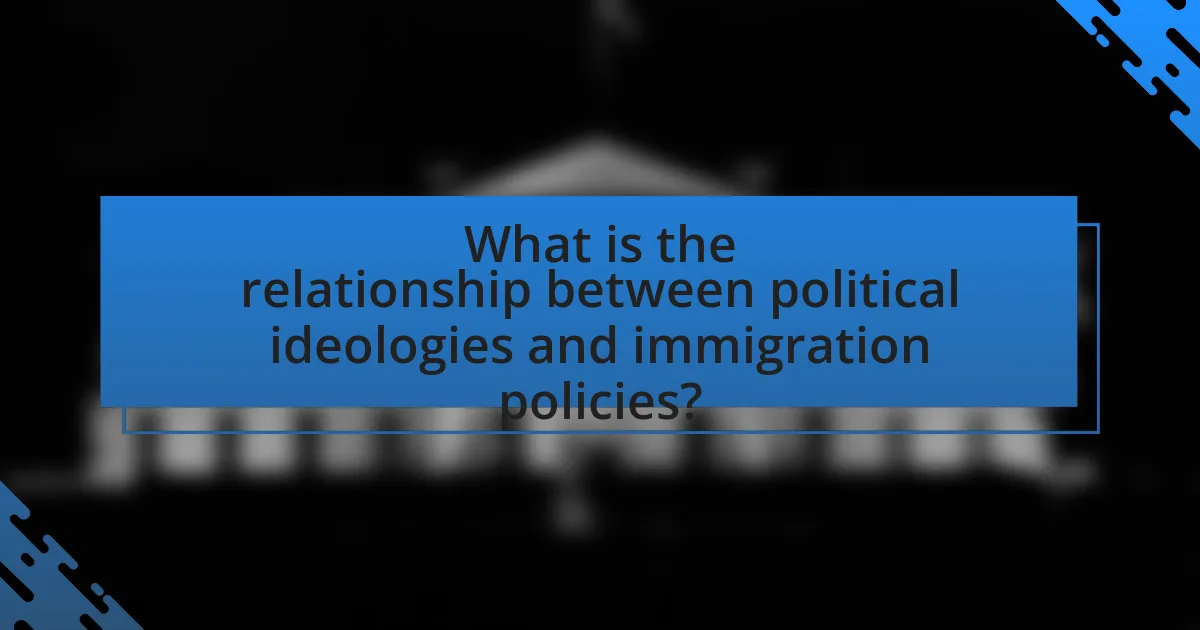
What is the relationship between political ideologies and immigration policies?
Political ideologies significantly influence immigration policies, as they shape the values and priorities of governments regarding immigration. For instance, conservative ideologies often advocate for stricter immigration controls and prioritize national security, leading to policies that limit immigration and enhance border enforcement. In contrast, liberal ideologies typically promote more inclusive immigration policies, emphasizing humanitarian concerns and the economic benefits of immigration, resulting in pathways to citizenship and support for refugees. Historical evidence supports this relationship; for example, the Immigration and Nationality Act of 1965, enacted under a liberal administration, aimed to eliminate racial quotas and increase immigration from non-European countries, reflecting progressive values. Conversely, the Trump administration’s policies, rooted in conservative ideology, included travel bans and family separations, illustrating how political beliefs directly translate into specific immigration practices.
How do different political ideologies shape immigration policies?
Different political ideologies shape immigration policies by influencing the values and priorities that guide decision-making regarding immigration. For instance, liberal ideologies typically advocate for more open immigration policies, emphasizing human rights, diversity, and the economic benefits of immigration, as seen in countries like Canada, which has implemented points-based immigration systems to attract skilled workers. In contrast, conservative ideologies often prioritize national security and cultural homogeneity, leading to stricter immigration controls and policies aimed at reducing immigration levels, as evidenced by the immigration policies enacted during the Trump administration in the United States, which focused on border security and limiting asylum claims. Additionally, socialist ideologies may promote immigration policies that support workers’ rights and social welfare, advocating for pathways to citizenship and protections for undocumented immigrants, as seen in some European countries that have implemented inclusive policies to integrate migrants into the labor market.
What are the key political ideologies influencing immigration policies?
Key political ideologies influencing immigration policies include liberalism, conservatism, and nationalism. Liberalism advocates for open borders and the protection of human rights, emphasizing the benefits of immigration for economic growth and cultural diversity. For example, studies show that countries with liberal immigration policies often experience higher GDP growth due to increased labor supply. Conservatism, on the other hand, typically supports stricter immigration controls, prioritizing national security and cultural cohesion. This ideology often cites concerns over job competition and social integration as reasons for limiting immigration. Nationalism emphasizes the importance of national identity and sovereignty, often leading to policies that restrict immigration to preserve cultural homogeneity. Historical examples include the rise of nationalist parties in Europe, which have influenced stricter immigration laws in several countries.
How do left-leaning ideologies approach immigration compared to right-leaning ideologies?
Left-leaning ideologies generally advocate for more open and inclusive immigration policies, emphasizing humanitarian concerns and the benefits of diversity, while right-leaning ideologies tend to prioritize national security and economic protectionism, often supporting stricter immigration controls. For instance, left-leaning parties in countries like Canada and Germany have implemented policies that facilitate refugee resettlement and promote pathways to citizenship, reflecting a commitment to human rights and social justice. In contrast, right-leaning parties, such as those in the United States and Hungary, have enacted measures that limit immigration, citing concerns over job competition and cultural integration. This divergence is evident in legislative actions, such as the Deferred Action for Childhood Arrivals (DACA) program supported by left-leaning politicians, versus the travel bans and border wall initiatives championed by right-leaning factions.
Why is understanding political ideologies important for analyzing immigration policies?
Understanding political ideologies is crucial for analyzing immigration policies because these ideologies shape the values, priorities, and approaches that governments adopt regarding immigration. For instance, liberal ideologies often advocate for more open immigration policies that emphasize human rights and inclusivity, while conservative ideologies may prioritize national security and economic protectionism, leading to stricter immigration controls. Historical examples, such as the contrasting immigration policies of the Obama administration, which favored pathways to citizenship, versus the Trump administration, which focused on border security and deportation, illustrate how political ideologies directly influence policy outcomes. Thus, recognizing the underlying political beliefs allows for a deeper comprehension of the motivations and implications behind specific immigration policies.
How do political ideologies reflect societal values regarding immigration?
Political ideologies reflect societal values regarding immigration by shaping the beliefs and policies that govern how immigrants are perceived and treated. For instance, liberal ideologies often emphasize inclusivity and human rights, advocating for policies that support immigration and multiculturalism, which aligns with societal values of diversity and equality. Conversely, conservative ideologies typically prioritize national security and cultural homogeneity, leading to stricter immigration policies that resonate with societal concerns about economic competition and social cohesion. Historical data, such as the Immigration and Nationality Act of 1965, illustrates how shifts in political ideology can lead to significant changes in immigration policy, reflecting the prevailing societal attitudes of the time.
What role do political ideologies play in public opinion on immigration?
Political ideologies significantly shape public opinion on immigration by influencing individuals’ beliefs about national identity, economic impact, and social integration. For instance, conservative ideologies often promote stricter immigration policies, emphasizing border security and the perceived economic burden of immigrants, while liberal ideologies typically advocate for more inclusive policies, highlighting humanitarian concerns and the economic contributions of immigrants. Research from the Pew Research Center indicates that 73% of conservative Republicans favor reducing immigration levels, whereas 62% of liberal Democrats support increasing them. This ideological divide illustrates how political beliefs directly affect attitudes toward immigration, shaping policy discussions and legislative outcomes.
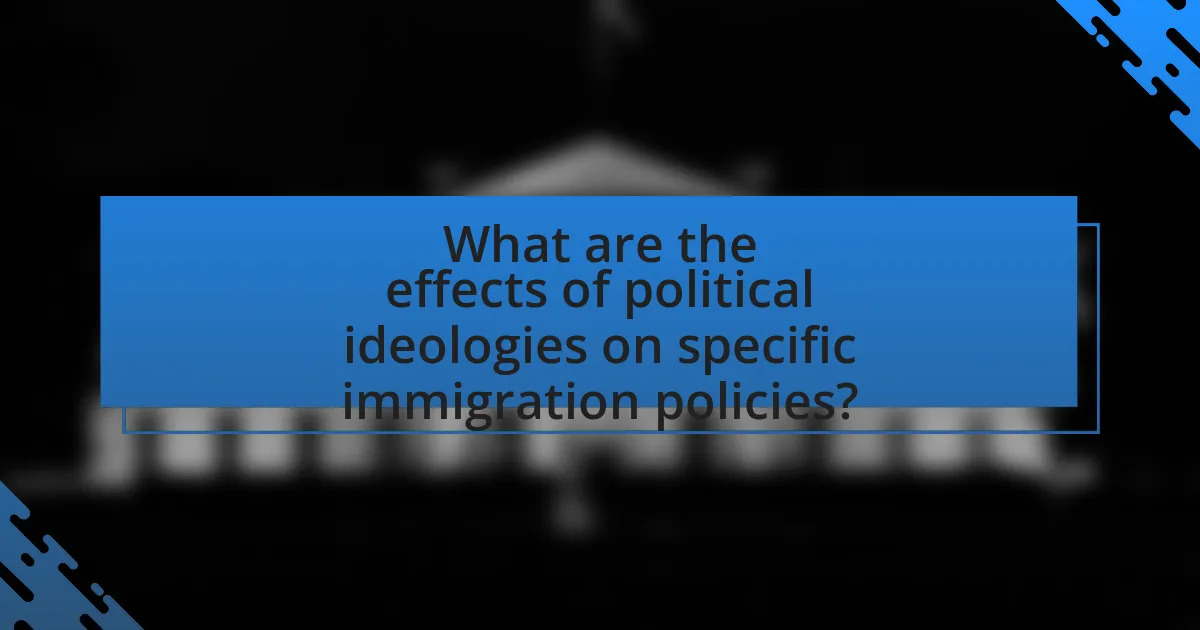
What are the effects of political ideologies on specific immigration policies?
Political ideologies significantly shape specific immigration policies by influencing the values and priorities that guide legislative decisions. For instance, conservative ideologies often advocate for stricter immigration controls, emphasizing national security and economic protectionism, which can lead to policies such as increased border enforcement and reduced pathways to citizenship. In contrast, liberal ideologies typically promote more inclusive immigration policies, focusing on humanitarian concerns and the benefits of diversity, resulting in measures like expanded refugee programs and pathways to legal status for undocumented immigrants. Historical examples include the Immigration Act of 1924, driven by nativist sentiments, which severely restricted immigration from certain countries, and the Immigration and Nationality Act of 1965, which reflected a more progressive approach by abolishing racial quotas. These ideological influences demonstrate how political beliefs directly translate into specific immigration policies that reflect the priorities of the governing party or coalition.
How do political ideologies influence border control measures?
Political ideologies significantly influence border control measures by shaping the priorities and approaches of governments regarding immigration. For instance, conservative ideologies often advocate for stricter border controls, emphasizing national security and the protection of domestic jobs, which can lead to policies such as increased funding for border enforcement and the construction of physical barriers. In contrast, liberal ideologies typically promote more open borders and humanitarian approaches, focusing on the rights of migrants and the benefits of diversity, which can result in policies that facilitate legal immigration and provide pathways to citizenship. Historical examples include the U.S. Immigration and Nationality Act of 1965, which reflected a liberal shift towards inclusivity, and the Secure Fence Act of 2006, driven by conservative priorities for enhanced border security. These ideological frameworks directly impact legislative decisions, resource allocation, and the overall tone of public discourse surrounding immigration.
What are the differences in border security policies across political ideologies?
Border security policies differ significantly across political ideologies, primarily categorized into conservative, liberal, and libertarian perspectives. Conservatives typically advocate for strict border enforcement, emphasizing national security and the need to prevent illegal immigration through measures such as increased funding for border patrol and the construction of physical barriers. For instance, the Trump administration’s policies included building a wall along the U.S.-Mexico border and implementing family separation practices to deter illegal crossings.
In contrast, liberals generally support more lenient border security policies, focusing on humanitarian concerns and the integration of immigrants into society. They often advocate for pathways to citizenship for undocumented immigrants and may oppose aggressive enforcement tactics. The Biden administration, for example, has sought to reverse many of the previous administration’s strict measures, emphasizing a more compassionate approach to immigration.
Libertarians, on the other hand, tend to favor minimal government intervention in border security, arguing that open borders would enhance individual freedom and economic growth. They often criticize both conservative and liberal approaches for being overly restrictive or paternalistic.
These ideological differences shape the policies enacted by governments and influence public opinion on immigration, demonstrating how political beliefs directly impact border security strategies.
How do political ideologies affect the treatment of undocumented immigrants?
Political ideologies significantly influence the treatment of undocumented immigrants, with liberal ideologies generally advocating for more humane and inclusive policies, while conservative ideologies often support stricter enforcement and deportation measures. For instance, during the Obama administration, a more liberal approach led to the Deferred Action for Childhood Arrivals (DACA) program, which protected certain undocumented immigrants from deportation. In contrast, the Trump administration, reflecting conservative ideology, implemented policies such as family separations at the border and increased deportations, emphasizing border security and immigration enforcement. These ideological differences shape legislation, public discourse, and the overall societal perception of undocumented immigrants, impacting their rights and treatment in various ways.
What impact do political ideologies have on refugee and asylum policies?
Political ideologies significantly shape refugee and asylum policies by influencing the values and priorities that guide decision-making. For instance, liberal ideologies often advocate for more inclusive and humanitarian approaches, leading to policies that prioritize the protection of human rights and the acceptance of refugees. In contrast, conservative ideologies may emphasize national security and economic considerations, resulting in stricter border controls and limited asylum opportunities. Historical examples include the contrasting responses to the Syrian refugee crisis, where countries with liberal governments, such as Germany, adopted more welcoming policies, while nations with conservative leadership, like Hungary, implemented stringent measures to restrict refugee entry. These ideological differences directly affect the legal frameworks, funding allocations, and public attitudes towards refugees and asylum seekers.
How do leftist ideologies typically respond to refugee crises?
Leftist ideologies typically respond to refugee crises by advocating for the protection and integration of refugees, emphasizing humanitarian assistance and social justice. These ideologies often prioritize the moral obligation to support individuals fleeing persecution and violence, arguing that countries should provide safe haven and resources for refugees. For instance, during the Syrian refugee crisis, many leftist political parties in Europe pushed for open borders and increased refugee quotas, reflecting a commitment to human rights and international solidarity. This response is supported by various studies, such as those conducted by the United Nations High Commissioner for Refugees, which highlight the importance of inclusive policies in promoting social cohesion and economic benefits for host countries.
What are the right-wing perspectives on asylum seekers?
Right-wing perspectives on asylum seekers often emphasize national security, economic concerns, and cultural integration. Right-wing political groups frequently argue that asylum seekers may pose security risks, citing instances of crime or terrorism associated with immigration. They also contend that the economic burden of supporting asylum seekers can strain public resources, particularly in welfare systems. Additionally, right-wing viewpoints often stress the importance of cultural assimilation, suggesting that large numbers of asylum seekers can disrupt social cohesion and national identity. These perspectives are supported by various studies and political rhetoric that highlight the perceived negative impacts of immigration on society and the economy.
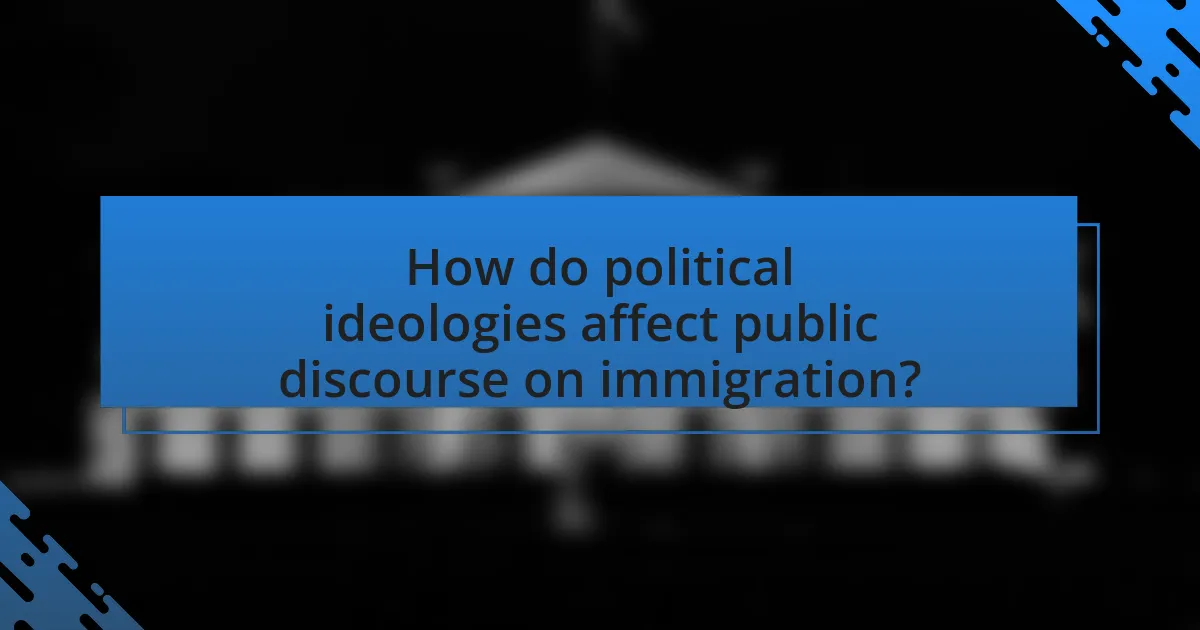
How do political ideologies affect public discourse on immigration?
Political ideologies significantly shape public discourse on immigration by influencing the framing of issues, the language used, and the narratives promoted. For instance, conservative ideologies often emphasize national security and economic protectionism, leading to discourse that portrays immigrants as potential threats or burdens. In contrast, liberal ideologies typically advocate for human rights and inclusivity, framing immigration as a humanitarian issue and emphasizing the contributions of immigrants to society. Research from the Pew Research Center indicates that political affiliation strongly correlates with attitudes toward immigration, with 73% of conservative Republicans favoring stricter immigration policies compared to only 25% of liberal Democrats. This ideological divide not only affects public opinion but also informs policy debates and media representations, ultimately shaping the national conversation around immigration.
What narratives do different political ideologies promote regarding immigration?
Different political ideologies promote distinct narratives regarding immigration, shaping public perception and policy. For instance, liberal ideologies often advocate for open borders and inclusive immigration policies, emphasizing human rights and the economic benefits of diversity, supported by studies showing that immigrants contribute significantly to GDP growth. Conversely, conservative ideologies typically emphasize national security and cultural preservation, promoting stricter immigration controls and often framing immigration as a threat to social cohesion, as evidenced by polling data indicating that a majority of conservative voters prioritize border security. Additionally, socialist ideologies may focus on the rights of immigrants as workers, advocating for their protection and integration into the labor market, reflecting historical movements that have sought to unite labor rights with immigrant rights. Each ideology thus constructs a narrative that aligns with its broader values and goals, influencing immigration discourse and policy outcomes.
How do media representations of immigration vary by political ideology?
Media representations of immigration differ significantly based on political ideology, with conservative outlets often portraying immigrants as threats to national security and economic stability, while liberal media typically emphasize the contributions of immigrants to society and the economy. For instance, studies show that conservative media frequently highlight crime rates associated with immigrants, framing them as dangerous, whereas liberal media focus on human interest stories that showcase immigrants’ struggles and successes, promoting a narrative of inclusivity. This divergence in representation influences public perception and policy discussions surrounding immigration, as evidenced by research from the Pew Research Center, which indicates that individuals exposed to conservative media are more likely to hold negative views about immigrants compared to those who consume liberal media.
What are the implications of these narratives for policy-making?
The implications of narratives surrounding political ideologies on immigration policies are significant, as they shape public perception and influence legislative decisions. For instance, narratives that frame immigration as a threat can lead to stricter border controls and enforcement measures, while those emphasizing the economic contributions of immigrants may promote more inclusive policies. Research by the Migration Policy Institute indicates that political rhetoric directly affects policy outcomes, with conservative narratives often resulting in restrictive immigration laws, whereas progressive narratives tend to support pathways to citizenship and integration programs. These dynamics illustrate how the framing of immigration issues can dictate the direction and nature of policy-making in this area.
How can understanding political ideologies improve immigration policy discussions?
Understanding political ideologies can significantly enhance immigration policy discussions by providing a framework for analyzing differing perspectives on immigration issues. Political ideologies, such as liberalism, conservatism, and socialism, shape individuals’ beliefs about the role of government, individual rights, and social justice, which directly influence their stance on immigration. For instance, liberals often advocate for more inclusive immigration policies that emphasize human rights and social integration, while conservatives may prioritize national security and economic stability, leading to stricter immigration controls.
By recognizing these ideological underpinnings, policymakers and stakeholders can engage in more constructive dialogues, identify common ground, and address the underlying values that drive immigration debates. This understanding can also facilitate the development of policies that are more broadly acceptable across the political spectrum, as evidenced by bipartisan efforts in various countries to reform immigration laws that consider both humanitarian and security concerns.
What strategies can be employed to foster bipartisan dialogue on immigration?
To foster bipartisan dialogue on immigration, stakeholders can employ strategies such as establishing common ground through shared values, promoting inclusive discussions that involve diverse perspectives, and utilizing data-driven approaches to inform policy debates. Establishing common ground involves identifying mutual interests, such as economic benefits of immigration, which can unite differing political ideologies. Inclusive discussions can be facilitated through town hall meetings or bipartisan forums that encourage participation from various community members, ensuring that all voices are heard. Data-driven approaches, such as presenting research from the Pew Research Center, which indicates that a majority of Americans support a pathway to citizenship for undocumented immigrants, can provide a factual basis for discussions and help bridge ideological divides.
How can stakeholders leverage political ideologies to advocate for effective immigration policies?
Stakeholders can leverage political ideologies by aligning their advocacy strategies with the core values and beliefs of specific political groups to promote effective immigration policies. For instance, stakeholders can frame immigration as a humanitarian issue to resonate with progressive ideologies that prioritize social justice and human rights, thereby garnering support from left-leaning policymakers and constituents. Conversely, they can emphasize economic benefits and national security to appeal to conservative ideologies, highlighting how immigration can drive economic growth and enhance public safety.
Research indicates that framing immigration discussions in alignment with political ideologies can significantly influence public opinion and policy outcomes. A study by the Pew Research Center found that messaging tailored to the values of specific political groups can increase support for immigration reforms by up to 30%. By strategically utilizing these ideological frameworks, stakeholders can effectively advocate for policies that address the complexities of immigration while gaining broader support across the political spectrum.
